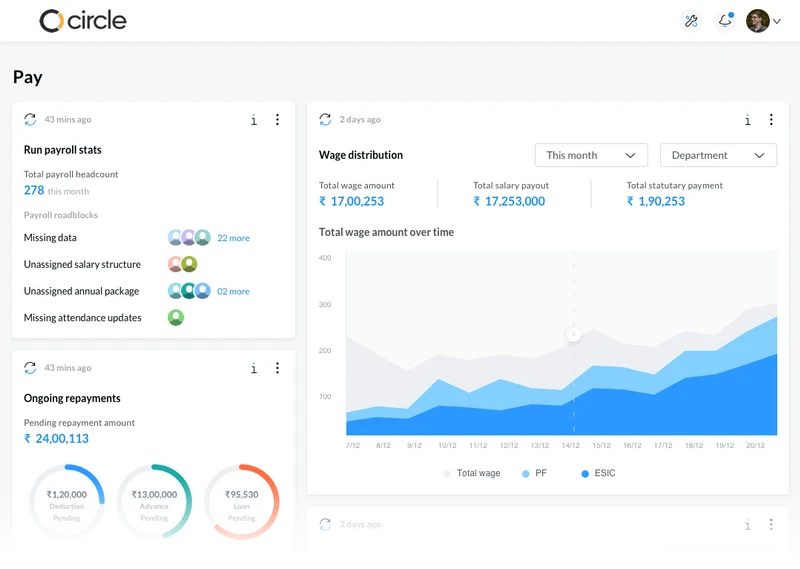The term remote working, digital nomads, home offices have been trending on the internet recently. As the world is going through this pandemic, most organizations have made necessary changes in their environment to cope up with the adjustments and function smoothly.
And one of them is introducing work from home for their employees.
Since this switch, half the people are raving about the perks of working from home while the rest of them are no satisfied with their work schedule. Everything in the world has its own pros and cons right?
Work from home is a boon for many, not for all.
This global pandemic has brought structural changes in the corporate world which have now become the new normal and will continue to stay for a longer period. Its usefulness lies in some of its inherent advantages which are both for employers and employees. It is worth noting here that due to AI-led growth in Information technology, it is now possible to perform tasks remotely which were not possible before.
Now apart from cost-cutting, the buzzword in circulation in the corporate world is for growth and optimization. This paved the way for the adoption of hybrid culture which is a mix of onsite working and remote working. Here, some of the operations which cannot be performed remotely are being performed through onsite operations. The remaining activities are being performed remotely.
Also, remote workers have been given the option to visit the office for some urgent works which they cannot execute remotely at their own convenience. For HR recruiters, the AI-led selection process has come as a big relief as now it is technologically possible for screening a large number of CVs and selecting whose profile closely matches with the available openings.
However, it does come with a few of its own challenges which are faced by both, the organization and the employee. If tackled carefully and gracefully, work from home is a win-win situation both for employer and employee.
DISADVANTAGES OF WORKING FROM HOME
Problem: Lack of community and teamwork
Aristotle, the Greek philosopher said, ” Man by nature is a social animal; an individual who is unsocial naturally and not accidentally is either beneath our notice or more than human. Society is something that preceded the individual”.
So it is quite evident that man strives when surrounded by like-minded people. In this case, an employee can give his best efforts to his/her company if they are around their work colleagues.
Some people like the idea of working alone, without any office distractions, and can live without any face-to-face interactions.
Solution:
- Prioritize face-to-face interactions through video calls, zoom meets, etc
- Set deadlines for team goals
- Establish remote workplace norms
Problem: Lack of Work efficiency
It sometimes happens that because of a lack of daily commuting to the workplace, a remote worker’s productivity of the tasks gets affected. It’s because it used to be a part of their routine but now, because of working from home, that routine got disrupted.
Then there’s the level of supervision they used to get while working onsite where their supervisors used to monitor their every single activity. However, since the implementation of working from home, it is not the same which in the end negatively affects the work and worker’s productivity.
Solution:
- Set a schedule. When working from home it is easy to get relaxed.
- Maintain your remote workplace hygiene
- Don’t let your friends drop by while you are working.
Problem: Prioritizing work to an excess
You need to be an expert at time management because we don’t have managers constantly looking at our work or managing time for us.
Every person in an office has a problem with sticking to their schedule and getting the work done and it’s especially challenging for remote workers who are flexible and have free-form days.
Solution:
- Limit the number of tasks you plan on doing each day
- Install distraction-limiting tools like freedom, serene, clod turkey blocker, etc.
- Manage your energy, not your time.
Isolation of remote workers
The remote workers who work from different geographical locations might feel that they are not accepted in the organization’s culture.
Because of this, the said person reports feelings of loneliness, stress, isolation, anxiety which are not only bad for the worker but are also bad for the organization’s productivity.
According to a survey of remote workers conducted by Gallup, it was found that about 21% of remote workers experience loneliness while working on their own. (Source)
Solution:
- Gravitate towards sunshine whenever you get the time in the morning.
- Take a break, have a cup of coffee, or go out for a walk once a day.
- Be proactive in reaching out, connecting, and interacting with others.
Remote collaboration
This is a challenge many organizations face with their largely distributed remote working teams. If working on a common project, organizations often have difficulty in understanding how their remote workers will be able to collaborate with one another on a virtual platform.
Collaborating with remote teams through either cell phone, skype or a zoom call is not as easy as it is said.
Collaborating with other workers is definitely a challenge many employees faces but it is an area of concern for the organization to make sure the productivity of the tasks does not get affected.
Solution:
- Create spaces for online collaboration
- Keep meetings predictable and to a minimum
- Set up communication systems for remote collaborations
Data security risks
When it comes to working from home, companies are at a huge risk. Due to the quick rise in remote or hybrid working, cyber attackers are easily able to create different kinds of viruses causing a data breach. Security risks that organizations have to face are phishing, ransomware, advanced persistent threats, etc.
According to a study on remote work and its security risks conducted by Open VPN, it was revealed that more than one in three organizations have had cybersecurity issues due to remote employees.
It was also revealed that about 90% of IT workers strongly believe that remote working is not secure. Remote workers are at a huge risk of getting data hack than those working onsite. (Source)
Solution
- Use encrypted communication tools
- Setup VPN
- Backup your data
ADVANTAGES OF WORKING FROM HOME
A few advantages of working from home for workers and their organizations are mentioned below:
Better work-life balance
Workers who are working from home are able to perform their duties and also able to look after their families while attending to domestic chores. They are easily able to spend some quality time with family take care of their personal life, and simultaneously able to perform their official duties without affecting the productivity of the task.
This is one of the important benefits of working from home.
According to a study by Christine Ipsen, Marc van Veldhoven, Kathrin Kirchner, and John Hansen, it was revealed that more people had positive experiences than negative ones of WFM during the lockdown.
It was also revealed that work-life balance is one of the main advantages of working from home. (Source)
Improved work efficiency
Many organizations have started using various artificial intelligence tools. Such tools help in keeping a track of their remote workforce teams and to provide them the exact level of supervision they used to get while working in the office.
Tools like employee monitoring software help in keeping a tab of the remote worker and in monitoring their every activity during working hours. Then there are tools like attendance tracker for employees which helps in tracking the attendance of every employee whether they are working onsite or offsite.
With the help of this tool, organizations can also track the tasks their workers are working on and how much time they take on a particular task.
Due to this, the remote workers get the feel as if they are working onsite which increases their motivation level and develops better engagement with their peers and colleagues.
Even if they are working from a remote location, through various virtual meeting tools, they can feel as if they are a part of the organization.
In a study by Clare Kelliher and Deirdre Anderson, workers with a flexible mode of working have a high level of job satisfaction and commitment.
They are also more likely to increase their voluntary effort in work as compared to those who don’t work flexibly which in the end, increases the productivity of the company. (Source)
Remote employee training
Assessing specific needs for training and development of remote workers and arranging for it is a big challenge for organizations. Before providing such specialized training, the remote worker has to be monitored closely.
To help them improve their performance, organizations have started using various employee training software through which such training is provided. It helps the remote workers in covering their areas of improvement.
Besides addressing the training concerns for existing employees, onboarding of new recruits is also of utmost importance. Such online training assists them to become operational from day one post completion of training and helps them in developing an overall knowledge of what is expected from them.
Remote employee well-being
It is true that since the beginning of the pandemic, the sudden shift in the mode of working from onsite to offsite has been very stressful for a lot of people. While working onsite, they used to have regular physical interactions with their peers and colleagues which used to keep them engaged and energized.
But with off-site working, everything changed in their mode of interaction.
To cater to the well-being of the remote workers, organizations have started conducting various virtual information sessions and social events to keep them engaged and energized.
With the help of such events, employees are able to catch up with each other and get to know the new hires.
The management has also started conducting various events and workshops on mental health where they provide some stress-relieving techniques to the remote workforce.
Such techniques help them in controlling and dealing with their stress and also improving their physical well-being.
Effective remote collaboration
With remote working, comes the communication and collaboration issues. In order to have a fast and flexible communication platform for all the workers, organizations have started using various remote collaboration tools.
Such tools allow for an easy mode of communication between the workers on a single platform without any miscommunication.
Such tools are not only used for communication but also for sharing files or any data. By adopting such tools, organizations are now able to communicate effectively across different geographical locations. All by keeping the data and information secured in cloud storage.
Dealing with data security
Cybersecurity experts consider remote workers as a threat as they are away from physical sight. For organizations, this is a really big challenge in detecting suspicious activities. This is where AI software plays a role.
Organizations have started adopting various tools which allow them in monitoring their remote workforce and to take action if any suspicious activity is detected.
These tools allow the organizations in increasing the productivity of their remote workers but also in taking immediate actions towards those who seem suspicious. Tools like user image records allow the worker’s image to be captured from the system’s webcam to look out for impersonators.
Screenshots of the worker’s screen and their images through webcam allow identifying unusual behaviour as they record every activity of the worker during their working hours.
Additionally here are some virtual team building activities which can help you improve productivity
Takeaway
It is high time that now the corporates should understand that besides focusing on cost-cutting, they should try to understand how to optimize their operations and to stay in business. The present economic conditions are not price-based but cost-based. Where to increase their profitability, price is not the determining factor but through cost control and optimization of operations only, they will survive.
Remote working has assumed tremendous importance due to its advantages which are made possible through AI-based advances made in information technology, there are also many challenges. But these challenges are not insurmountable. If there are logical and transparent guidelines by corporates, then definitely there will be a better trust factor between employer and employee and will work with dedication.
So what is your take away? Mention it in the comments below.
If you’re looking for an HRMS at sumHR, the all in HR Software from recruitment to exit. Get access to payroll management software, attendance management system, performance management & 360 review software and more. Book a free demo now or start your 7 day free trial.
FREQUENTLY ASKED QUESTIONS ( F.A.Qs)
1. How does your manager know you are working while working from home?
He/she doesn’t. It is not possible for your manager to check on the work of each and every employee in the company. This is where trust comes into the picture.
Your manager will keep the faith of trust with you and know that you will do the work assigned and it is your duty to ensure that you do not break that trust.
2. Should you work for long/odd hours?
There is a strong misconception that working from home is very different than working from the office. The truth is that for most of us standard office hours are the norms.
You should work only along the hours you used to do in the focus. If you left your office by 6 p.m, make sure you stop working at the same time when at home.
This will ensure a happy and healthy lifestyle and help in keeping optimum energy levels.
3. Are you allowed to do tasks not created to work during the day?
Generally speaking, yes. You are allowed to work on tasks not related to the office during the day. These are the breaks that you need to be more productive when you actually work.
Sitting in front of the laptop for hours makes you lethargic so taking a short break to do some household chores is completely fine.
That being said, if you have work outside the office that you know will take a major part of your day then you can shift that work for the weekend when you have an off.








